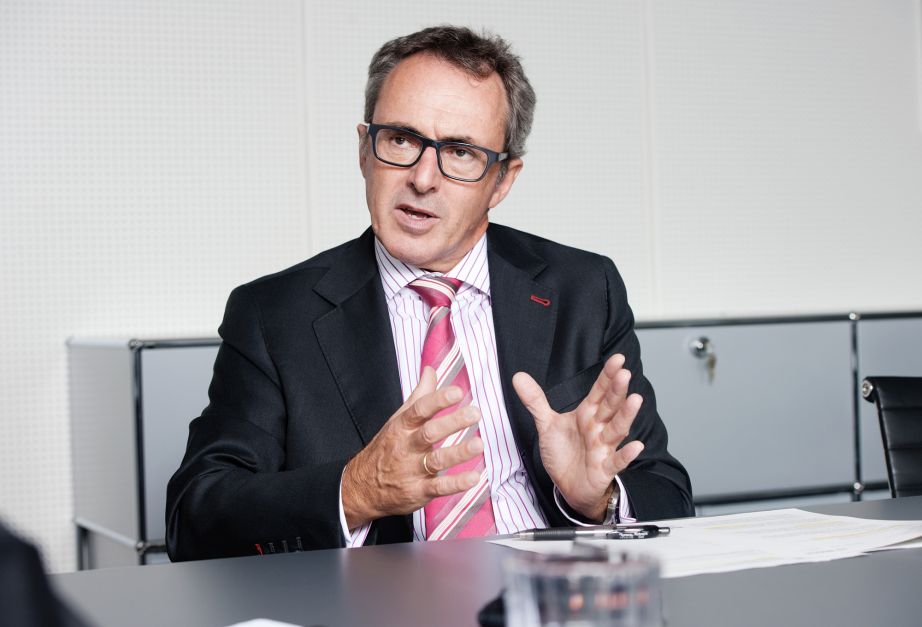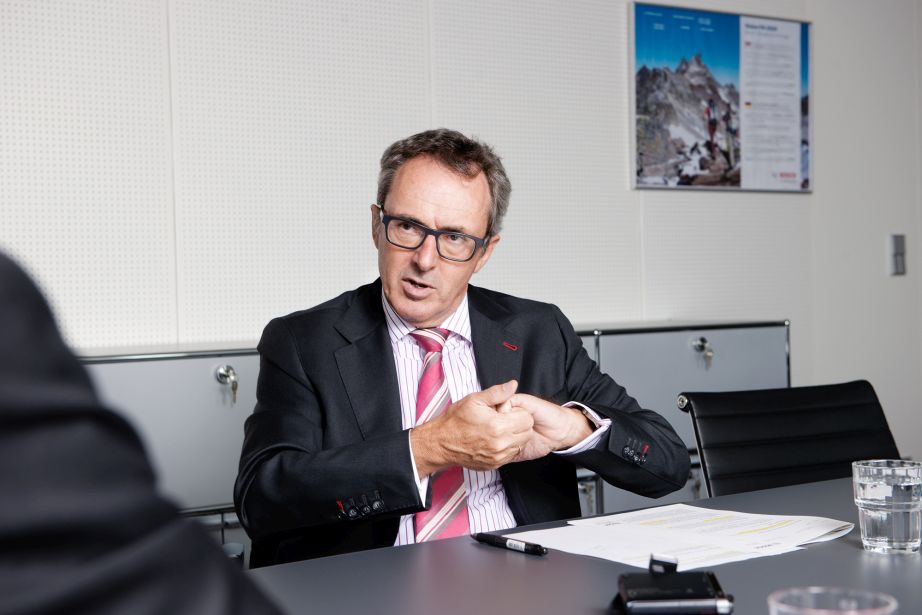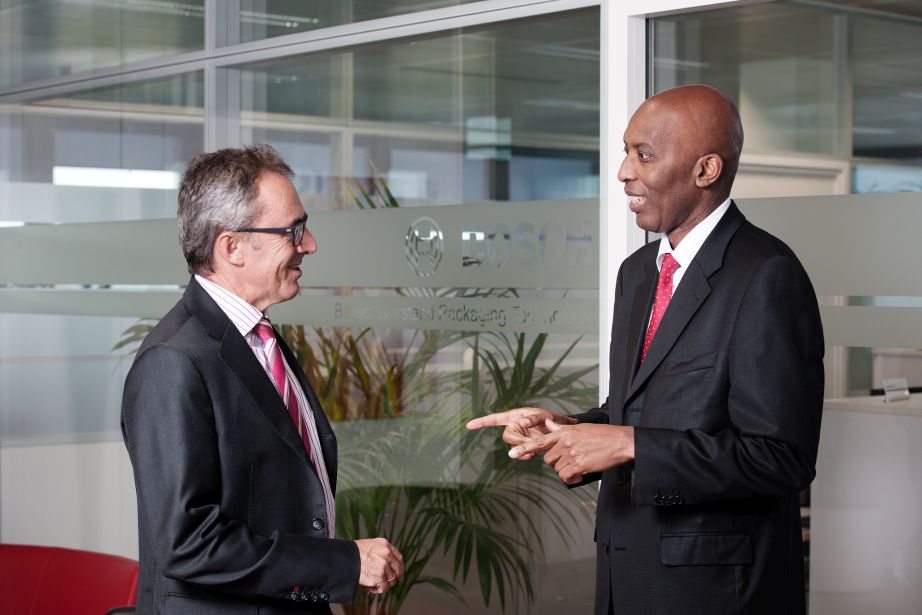Interview with Friedbert Klefenz, Chairman of the Divisional Board of Bosch Packaging Technology
"We intend to undertake a larger study for West Africa in the first or the second calendar quarter 2015, in order to look more closely at the market potentials."

Friedbert Klefenz, Chairman of the Divisional Board of Bosch Packaging Technology
Mr. Klefenz, you acted as President of the Interpack 2014 trade fair and held an impulse lecture at the Save Food Conference. What I detect at each Interpack trade fair is how fast the packaging industry continues to develop. How many employees are active in the research and development of packaging machines at Bosch Packaging?
Klefenz: The exact figure cannot be indicated, as the boundaries between research, development and construction often overlap. The fact is: We currently employ a total global workforce of around 7.000 people working in different areas and functions. Around 40% of our people work in the field of technical project implementation, respectively in construction and development. Since we only rarely offer ready-made plants, but mostly particular customer-specific solutions, our design engineers are often simultaneously also our developers.
I was present almost every day at the interpack. However, I came to realise during my research that you achieve almost 45% of your turnover with the packaging of pharmaceutical products.
Klefenz: We generate roughly half of our turnover with pharma customers, the other half with customers from the food industry. A small share of our business is generated with customers from other areas, for instance the cosmetic industry.
I realised that you export 90% of your products.
Klefenz: From the German perspective: yes. In Germany, we sell a maximum of 10% of our plants assembled here. The majority of plants are destined for export. The same also holds good for our plants, which we for instance manufacture in Switzerland or in the Netherlands. Our 13.000 customers produce and pack their goods all over the world, whether in Europe, North and South America, Asia or indeed in Africa. Accordingly, we supply them either from our primary plants in Europe, or from our sites located in the respective region.
How many sites do you have in the European Union?
Klefenz: We operate around 40 sites worldwide, about half of which in the European Union.
In November 2014 you attended a big trade fair in the USA. What implications do these trade fairs have for Bosch Packaging Technology?
Klefenz: You certainly refer to the PackExpo in Chicago. In 2013, we generated roughly one fourth of our turnover on the American continent, the major part thereof in the USA. I assume that, for 2014, the share of turnover is even slightly higher. For us, the United States represent the biggest individual market in the world, bigger than Germany and China. That is the reason why this trade fair is extremely important for us.
We now come to the Asian market with special attention given to China. What does China mean for you?
Klefenz: In China, we experienced an excellent development in the last ten years. Every year we recorded growth with clearly double-digit percentage rates. In the last barely two years, however, we witnessed a certain flattening of growth, and in some areas even stagnation.
But what I notice is that Chinese people buy a lot of things in Europe. They wish to have the original product.
Klefenz: We offer our Chinese customers both. Complex new developments normally originate in our European development centres. The less complex, but nevertheless high-quality and robust applications are purchased by our customers in China. This double-track supply is a key element of our strategy, which we internally call PA 2020.
More on the theme 'complex' and 'simple'. You could do the same in Africa.
Klefenz: This is indeed what we do for quite a while already, even though it is not all that long ago that we are present there.
When exactly?
Klefenz: A staff member opened a sales office in Cape Town in 2009. Back then, we mainly sold imported new machines. Meanwhile six employees are working there, who also perform smaller assembly and service works. In 2012, we opened an office in Cairo, which deals with the markets in North Africa and in the Middle East. In 2013, we established a site in Nigeria. In Kenya too, packaging specialists have recently become locally available at the Bosch site in Nairobi, so as to best service our customers on site.

So what is the current situation in West Africa?
Klefenz: For this region, the distribution and service activities are at present primarily performed via our West African site in Lagos, Nigeria. But our objective is to show even greater presence. Ghana for instance is a country at which we presently take a closer look.
You named five African countries, which are either Arabic or English speaking: Egypt, South Africa, Kenya, Nigeria and Ghana. Now I offer you Senegal in West Africa as a French speaking country.
Klefenz: Senegal is an attractive country too…
Let us talk about the products, which the West African people buy from you. I mean the packaging for foodstuffs. Which areas do you cover?
Klefenz: In the past these were especially soup cubes, which provided the sales figures. Even today, dozens of machines are still used in Africa for such packaging purposes. Today, we additionally pack for smaller, medium-sized and big customers also flour, sugar and further basic foodstuffs.
Senegal is the biggest salt producer in West Africa, but locally there is still no packaging plant for salt. Moreover we encounter in West Africa the same problems as in Kenya. Fruit and vegetables rot away after harvesting.
Klefenz: We intend to undertake a larger study for West Africa in the first or the second calendar quarter 2015, in order to look more closely at the market potentials.
You spoke of a symposium in West Africa. What exactly are your intentions there?
Klefenz: We want to achieve two primary objectives using the dialogue: Firstly, we want to know what motivates our (potential) customers in West Africa, and how we can help the West African people with our technology to reach their growth targets. Secondly, we want to show and explain them what we are technically able to offer. We are one of the biggest and most experienced suppliers of production and packaging technology in the world. By pointing to these unique selling features, we can and want to fascinate the people in West Africa. Of course, we also want to gain new market shares. And finally we want to contribute to protecting foods and medicines with packaging technology.
The problem with Bosch Packaging Technology is that, when somewhere in the world and especially in our country Senegal reference is made to Bosch, we think of cars. How can you show people that Bosch is not only a producer of car accessories, but also of packaging facilities?
Klefenz: Quite simply, by improving the visibility of Bosch as supplier of packaging technology. However, we will not succeed in doing so with marketing or advertising campaigns alone. We can reach more visibility especially with continuous communication. We demonstrate how packaging technology contributes to improving the quality of people's lives. This is also a reason why we support the FAO Initiative Save Food. Only safely and professionally packed foodstuffs will help to reach a situation where hunger will no longer have a chance in this world. What is the use of initiatives for more rice, potatoes and flour, if these foods perish on their way from the field to the plate? The business with packaging technology provides not only economic, but also social benefits in Africa, Asia and anywhere in the world. This is the massage we wish to transmit.
Mr. Klefenz, many thanks for the interview.
This Interview was held by Ibrahim Guèye






